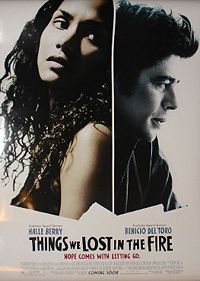Hollywood and Halle Berry

The meager box office of “Things We Lost in the Fire” has been a disappointment to everyone I know who’s seen the movie, because they all leave the theater raving about the performances. One friend, New York-based actor David Ginn, got to thinking about one of those standout actors. Here’s Ginn’s report:
Five years after winning the Academy Award, for “Monster’s Ball,” Halle Berry remains the most significant black actress working today. She has suffered from the post-Oscar box office curse that often follows Best Actress winners — most recently, Reese Witherspoon with the dismal opening of her latest film, “Rendition.” Alongside notable disappointments like “Catwoman” and “Perfect Stranger,” Berry has retained her movie-star status due to the success of the “X-Men” franchise; the Oprah-produced TV film, “Their Eyes Are Watching God”; and modeling contracts with Versace and Revlon.
In her latest effort, “Things We Lost in the Fire,” Berry plays a wife and mother whose husband dies suddenly. In her grief, she reaches out to her dead husband’s best friend, a junkie played by Benicio del Toro. Berry delivers a top-notch performance, accompanied by her uncanny ability to look extraordinarily lovely without a stitch of make-up.
         While doing press for the movie, Berry stated that she was not the first choice for the role. Yes, she revealed, her character was written “white.” She added that one of the major concerns with casting her was finding actors to play her children. The story by design isn’t an interracial love story, but does having a black leading lady change the tone of the story? If the lead is Halle Berry, then it does not. But would the same be true if another black actress were to step in the role? Which actress has the ability to appeal to and/or arouse both black and white audiences? And no, Beyonce doesn’t count: she doesn’t consider herself to be primarily an actor.
Next to Berry, Hollywood‘s most bankable actress is Queen Latifah. Since 2002, Latifah has enjoyed a string of big-budget successes including: “Bringing Down the House” “Chicago,” “Beauty Shop,” and most recently, “Hairspray.” She has a lucrative contract with Cover Girl and continues to release music. Yet you won’t see Berry and Latifah at the same casting. Jennifer Hudson and Queen Latifah? Absolutely. (Imagine if Halle Berry could sing.)
As for other beautiful Hollywood actresses of the moment there is Kerry Washington of “Ray” and “The Last King of Scotland,” who has a cosmetic contract with L’Oreal. Washington, whose bee-stung lips gave Angelina‘s a run for her money in “Mr. and Mrs. Smith,” is gaining face recognition. But her name still isn’t at the top of most moviegoers’ list of black actresses.
When any discussion turns to black actresses is Hollywood, the question is inevitably asked: Where’s the next Halle Berry? My response would be: we shouldn’t look for “the next Halle Berry” or “the next breakout star.” We should look for and demand breakthrough performances from all our actors. Actors should be judged primarily by their talent, not by their beauty or looks. Adopting this standard makes Halle Berry a better actor: it wouldn’t be the character’s race that we saw, but the actor’s. If the actor is black, then we apply all of our associations of blackness to them, defining the character as black as we define black to be. How do you define being black in America anyway?
The only major effect of Berry’s Oscar win (and Denzel Washington‘s most recent one, for that matter) is that there has been an increase in the number of successful black-themed films. But many of them have been niche-marketed fare rather than movies like “Monster‘s Ball,” which have more universal racial appeal. Thanks a lot, Tyler Perry.
